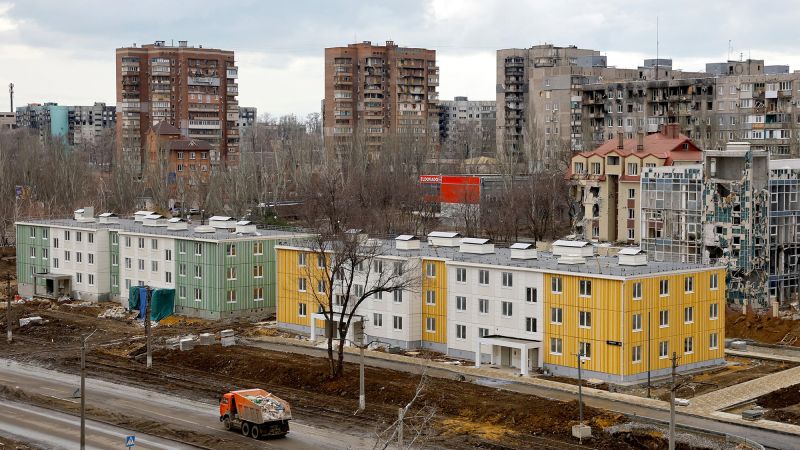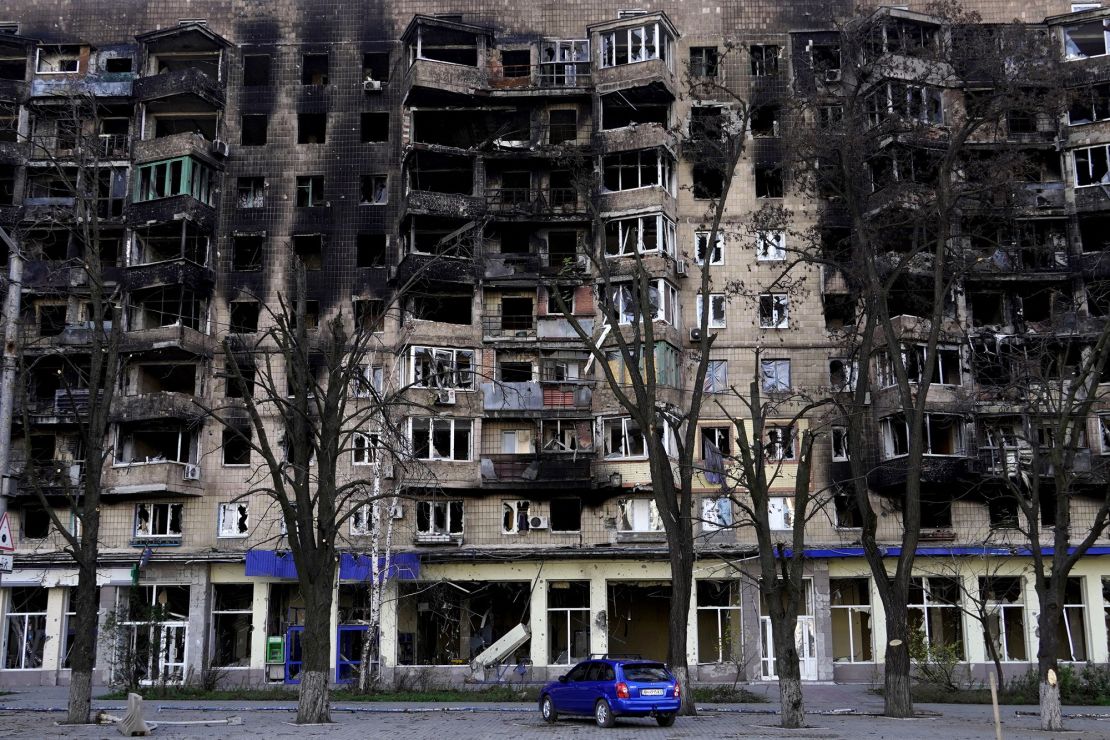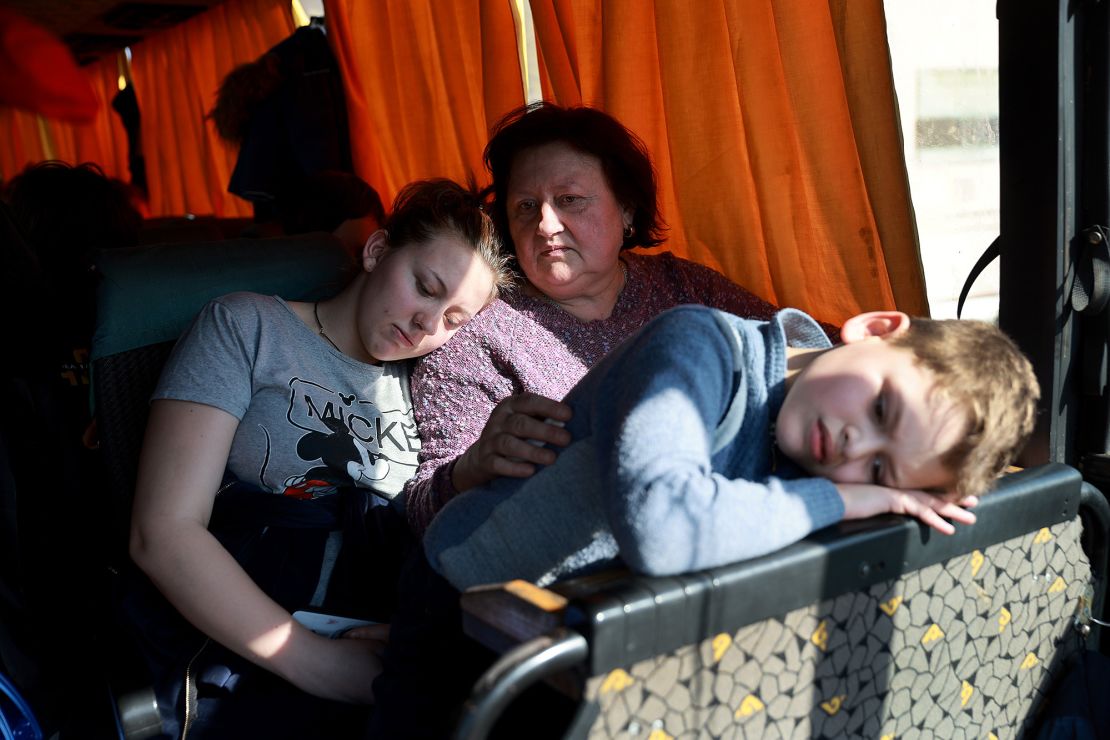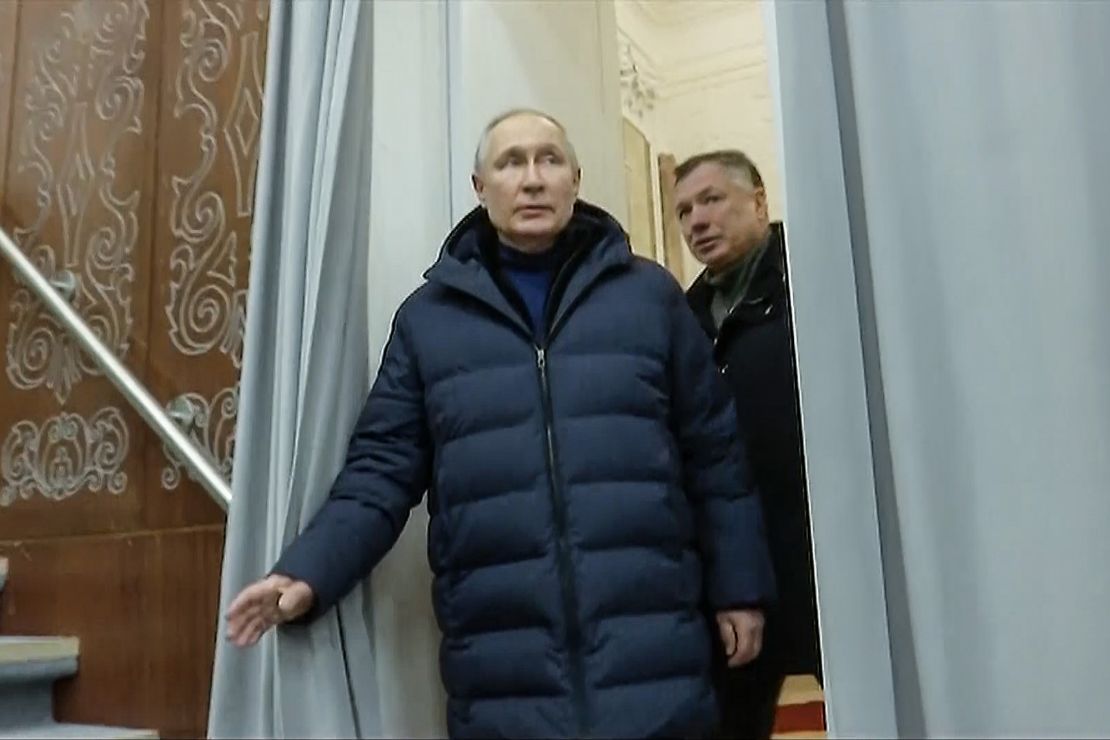CNN
—
Three years after it seized control of Mariupol following a brutal 86-day siege, Russia is using a more subtle power to keep its grip on the Ukrainian port city: social media influencers.
A CNN investigation found that residents of the occupied city, including schoolchildren, are being trained in new media programs and “blogger schools” with ties to the Russian state.
Though their follower counts and overall reach pale in comparison to celebrity influencers, experts say that the Kremlin needs local voices to effectively promote life under Russia’s rule.
“Just look what Russia is getting up to in Mariupol,” Pavel Karbovsky, a teacher at one of the blogger schools, said in a recent TikTok video highlighting the construction of new apartment buildings. “Wait, they’re building, not demolishing… this is Mariupol, our Russian town!”
Karbovsky is among a growing number of content creators painting a picture of renewal in cities and towns across the four Ukrainian regions illegally annexed by Russia in 2022 – Donetsk, Luhansk, Kherson and Zaporizhzhia. He said he is not operating as a propagandist. Instead, his mission is “to show the truth” about life in Russian-occupied areas, he told CNN in a video interview from Donetsk.
But Russian-backed occupation officials have been actively encouraging creators like Karbovksy to post about the restoration of the “liberated” territories, including in official meetings.
In January, Karbovsky was among a group of content creators invited to meet with Denis Pushilin, the Russian-backed head of the Donetsk People’s Republic (DPR). Pushilin said in a statement on Telegram that he was “counting” on the group to spread the word that the eastern Donbas region was “being revived.”
“We are all united by an immense desire to restore and revive Donbas. And people should know as much information as possible about the large-scale work that is already underway,” the post continued.
CNN analyzed over a dozen profiles of local influencers promoting Moscow’s Russification project in Mariupol on social media platforms, some of which are openly pro-Russia and blame Ukraine for the pain inflicted on the region, while others appear apolitical. Despite their modest audiences – ranging from 3,000 to 36,000 on TikTok – their reconstruction-focused content can garner hundreds of thousands of views.
But absent from their videos is any context on the reason for rebuilding.
Russia’s siege of the port city, once known as a hub for trade and manufacturing, was one of the deadliest and most destructive battles since Moscow launched its full-scale invasion of Ukraine more than three years ago.
According to United Nations estimates, 90% of residential buildings were damaged or destroyed in Mariupol during Russian attacks, and around 350,000 people out of the pre-war population of about 430,000 were forced to flee. Ukrainian President Volodymyr Zelensky said in a recent interview that 20,000 civilians are believed to have been killed, though the death toll is impossible to verify. Ukrainian officials accused Moscow of trying to cover up evidence of civilian casualties, a claim the Kremlin denies.
“Moscow seeks to interrupt the flow of information about the terrible destruction brought by the Russian army,” Ihor Solovey, director of the Ukrainian government’s Center for Strategic Communications and Information Security, said in written comments to CNN. To counter this, he said, Ukraine is trying to “convey even more facts about the crimes of the occupiers,” adding that “there are more than enough of them to completely refute any Russian fakes about the ‘beautiful life’ under occupation.”
For Moscow, maintaining control of Mariupol remains a strategic priority and a focus of significant investment. “We are paying a lot of attention to Mariupol,” Russian President Vladimir Putin said during his annual press conference in December. In March 2023, he staged a highly choreographed trip to the city, discussing “restoration” efforts with local officials. In a video that circulated online of him meeting residents, a voice off-camera could be heard shouting: “It’s all lies, it’s just for show.”
While construction is clearly ongoing, CNN’s analysis of satellite imagery, interviews with residents and videos posted to social media show significant destruction remains. Many who lost their homes in 2022 have not been rehoused and the quality of new housing is often inadequate. Residents say Russian authorities are also seizing homes from Ukrainians who fled the city to give to others.
“They have created a kind of Potemkin picture… But people don’t live there, in many houses, they don’t live there,” one Mariupol resident said, referencing the fake villages built by Grigory Potemkin in 18th-century Russia to impress Catherine the Great. He spoke to CNN anonymously for fear of reprisals.
CNN has reached out to the Russian-backed mayor of Mariupol and the Russian government for comment on the claims.
In September, an organization called the Donbass Media Centre (DMC) opened its “blogger school” in Mariupol. It offers free two-week courses designed to give aspiring influencers a technical grounding in skills like filming and editing, as well as an understanding of how to gain popularity and make money online.
Similar courses had already been held in Donetsk and Luhansk, and another followed in Melitopol, in the Russian-occupied part of Zaporizhzhia. Karbovsky was one of the teachers.
“I know how to gather views, make content so I was invited to teach kids between 16 and 22,” he told CNN. Neither Karbovsky, nor the school’s coordinator would tell CNN who finances the program, but it appears to have the tacit support of the Russian government.
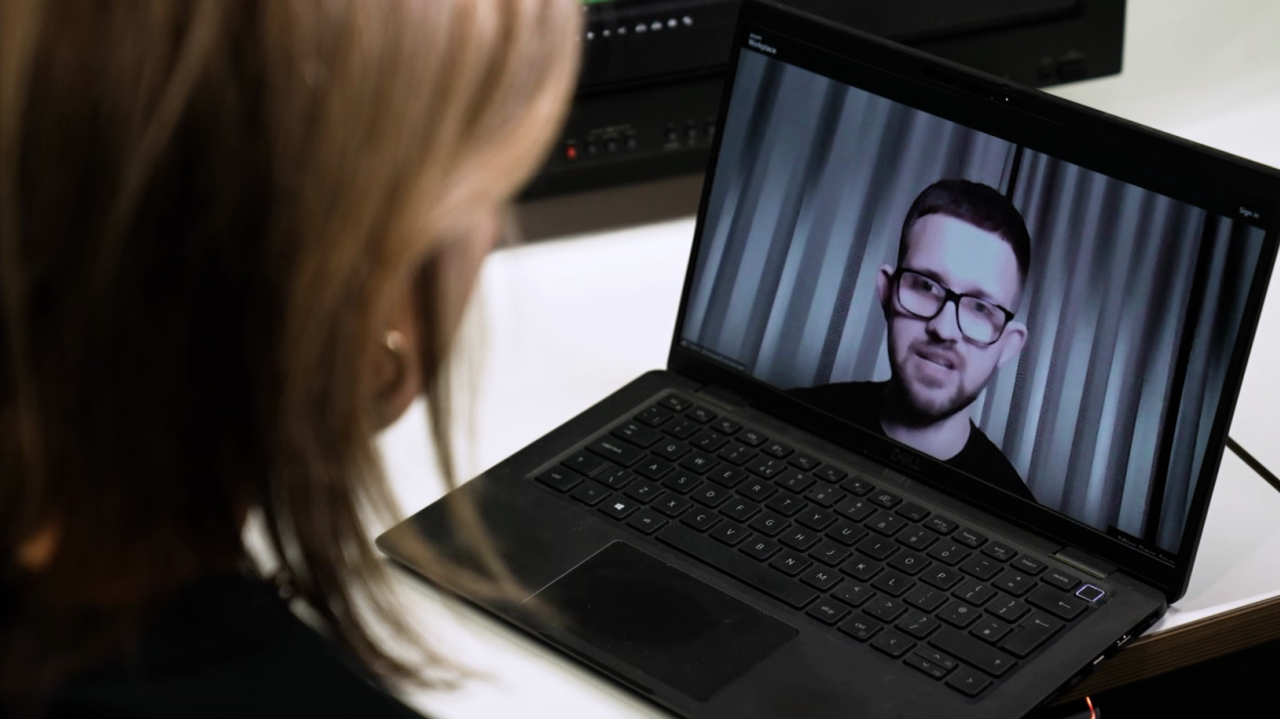
Clare Sebastian speaks with content creator Pavel Karbovsky, who teaches at a Mariupol “blogger school.”
The DMC was set up by Donbass Media, a pro-Russian news channel mostly operating on social media. In 2024, the DMC won a Runet Prize, a national award of the Russian Federation and Presidential Foundation for Cultural Initiatives that celebrates excellence on the Russian internet. It also has a partnership with “Top Blog,” a competition for content creators run by a Kremlin program called “Russia – Land of Opportunities.” Last year, the most successful DMC students won a trip to Moscow to visit the headquarters of Vkontakte, Russia’s version of Facebook.
Vkontakte is among several Russian social media networks owned by state-run Gazprom-Media. The Kremlin has clamped down its control of social media in recent years, through ownership, internet slowdowns, and, more recently, legislation requiring influencers with over 10,000 followers to register their personal details with Russia’s media regulator, Roskomnadzor.
Karbovsky said the DMC’s aims are not political. “DMC does not have any such goal to create some sort of propagandists – no way. We don’t need this,” he said. “We want people to be able to share their different views about what is happening in the DPR (Donetsk People’s Republic) and the LPR (Luhansk People’s Republic) and other regions.”
The same month the DMC opened its “blogger school” in Mariupol, graduates of a Russian government program called “The New Media Workshop” opened a media center in Mariupol to teach schoolchildren 14- to 17-years-old photography, filming and how “to work in the social networks.” The free program is funded in part by a Russian presidential grant worth around $12,000. Participants are encouraged to show the positive side of Mariupol.
“We look forward to welcoming talented kids, so together we can talk about the life of our beloved city,” reads an October Telegram post from the media center. In another, a participant in the course interviews children about how Mariupol has changed. “It’s become much more interesting, more colorful,” says one young girl. “It’s developing quickly,” her friend adds.
In March, Rutube – an alternative to YouTube owned by Russia’s Gazprom-Media – announced it was setting up “studios” in cities and towns across the four annexed regions, including in Mariupol, where content creators could access high-tech equipment and training programs. The initiative is part of a joint project with the Russian Military Historical Society, which Putin created by presidential decree in 2012 to “counter attempts to distort” Russia’s military history.
“The world now really needs the truth about the lives of the new Russian citizens who have gone through a lot… but chose to speak Russian, think and dream in Russian,” one of the organizers said in a press release.
Andrei Soldatov, an expert in Russia’s intelligence services and state surveillance on the internet, says there’s no doubt who is directing these efforts. “It’s top level, it’s not regional, it’s not decided on the level of say the administrations of the occupied territories. It’s all about the Kremlin,” he told CNN.
Most of the social media accounts CNN analyzed started posting after Russia’s invasion and share content with a common theme: portraying Russian revival efforts in Mariupol in a positive light.
“When I heard people say Mariupol was a bad city, that nothing’s left of it, I wanted to show that the city is alive, is recovering, and that’s why I started showing what is really happening here,” Elizaveta Chervyakova, a 21-year-old DMC graduate from Mariupol, told CNN in a video interview from the city.
One of her most popular recent videos, with over 177,000 views, is a montage of both damaged and rebuilt buildings in the city set to a voice-over that states: “Mariupol – the seaside capital of Southern Russia.”
She told CNN that posting about the region’s recovery is becoming a trend.
“Look how beautiful,” another content creator, known as “Masha from Mariupol,” says in a TikTok video showing off newly built apartment blocks at sunset. “These apartments are filled with happy people… a wonderful region for family life.”
In other clips, she poses in front of a war memorial, gives a tour of the reopened railway station and shows off construction at the Drama Theater, where hundreds of civilians were killed in a Russian airstrike.
“This is to those who think Mariupol is Ukrainian. Remember it is forever Russian,” reads the caption of one post. Masha, well-known in pro-Russian circles but not unaffiliated with the “blogger schools,” declined CNN’s request for an interview.
Posts like hers, about the rebuilding and Russification of the occupied territories, were the most liked and watched videos on accounts that CNN reviewed.
“They are clearly very grassroots,” said Darren Linvill, a professor at Clemson University and expert in social media disinformation, who reviewed the same accounts for CNN. He noted that while many use the same talking points, “we don’t see them directly engaging with Russian state sources.”
“They are approachable,” he added.
And that is part of the Kremlin’s strategy, experts say. Soldatov told CNN that local influencers are key to Russia’s attempts to win hearts and minds in occupied Ukraine, where audiences are less susceptible to mainstream propaganda.
“You cannot use automatically the voices which are familiar for the Russians who live in central Russia or Siberia or Moscow, you need to find local voices who understand how to talk to people who live in these territories,” he said.
Satellite imagery reviewed by CNN between April 2022 and March 2025 show Moscow has been piling resources into rebuilding and Russifying parts of the city, constructing a new naval academy affiliated with one in St. Petersburg, a large memorial to commemorate the “liberators of the Donbas” and entirely new neighborhoods.
Shiny rooftops of restored, or in some cases newly built, apartment blocks are visible dotted in and around the city center, having mostly replaced buildings destroyed in the war, satellite images from late 2024 show.
But in other areas the scars of the conflict are still visible.
In a satellite image from December last year, a crane can be seen next to the Drama Theater, where the Russian word for children, ДЕТИ, was scrawled in the spring of 2022 – a failed attempt to deter Russian bombs. Russian state media has reported that the theater will be finished this year.
In December, Putin claimed in a press conference that at least 300,000 people had returned to Mariupol and said, “the population continues to grow at a rapid pace.” In March, he signed a decree ordering all residents of the four regions to get a Russian passport by September 10 or leave.
Mariupol’s Ukrainian exiled mayor, Vadym Boichenko, told CNN that only around 100,000 Ukrainians are estimated to remain in the city – including some who left during the siege and have since returned.
Boichenko said he believes Russians are being lured there not only through positive news stories and social media posts, but also by Russia’s preferential 2% mortgage rate for its “new territories” – a significant draw in a country where market rates are currently as high as 29%.
Russia has promised to provide “compensatory housing” to everyone affected by the war, but in videos circulating mainly on Telegram, groups of Mariupol residents claim they still have not received their apartments and deliver direct appeals to Putin for homes.
In one video that surfaced in January, some hold up a sign that reads “БОМЖИ,” a Russian acronym meaning “homeless people.” One person says they are being offered apartments belonging to residents who left Mariupol. “We earned our apartments, we don’t want other peoples,” she says, urging the authorities to continue building. The Russian-installed mayor of Mariupol has said some residents will be given “abandoned” properties, effectively stripping those who left the ability to return.
CNN analyzed satellite imagery of the addresses mentioned in the video. At one location, less than a kilometer from the devastated Azovstal steel plant, a block of buildings was cleared, leaving only the remnants of foundations. But in nearby streets, rebuilding is underway.
Two Mariupol residents, a couple who left the city last November and spoke to CNN on the condition of anonymity as they plan to return, said the prices of new apartments are often so high no Ukrainians can afford them and there are serious issues with quality.
The newly built Nevsky neighborhood that Putin visited in 2023, for example, is not connected to the sewage system, they said.
They added that the posts from content creators do not accurately portray reality in Mariupol. “It is targeted at people who do not live (in Mariupol) and do not know this entire situation,” the woman said.
And pro-Russia content creators can’t rewrite history, Boichenko added. “This propaganda, these made-up clips that they are doing now in Mariupol, will not help. Russia has committed a crime in Mariupol, and the people of Mariupol know it,” he said.
CNN’s Allegra Goodwin and Gianluca Mezzofiore contributed to this report.

